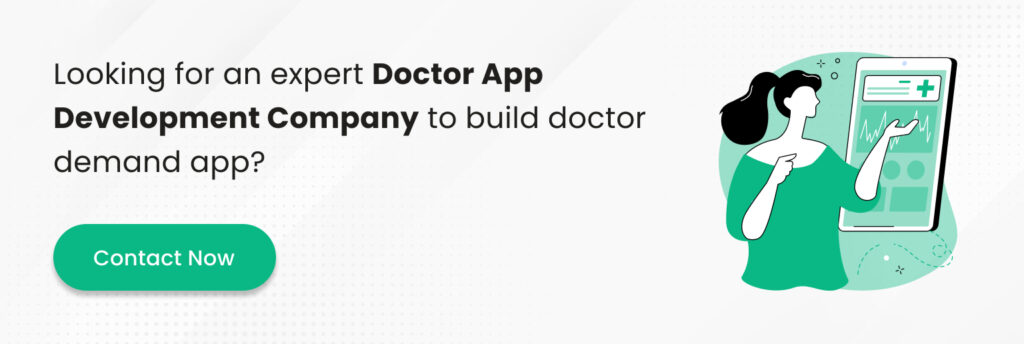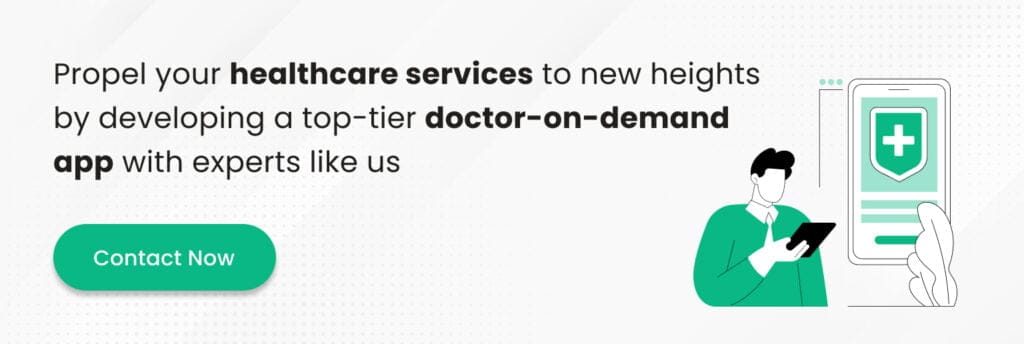Doctor On Demand App Development : 2025 Guide
Keyur Patel
September 12, 2025
12 min
We all know the process when you need to see a doctor. You call to make an appointment, take a half day off work, drive across town, wait in a crowded waiting room. There has to be a better way, right? Healthcare app developers are revolutionising healthcare delivery by providing virtual consultations with licensed physicians from the comfort of your home through doctor demand app.
That’s where these new doctor-on-demand app development are looking to shake things up in a big way. These telehealth services are betting that people are ready to ditch the old-school clinic experience for some on-demand, virtual medical care from the comfort of their couches. Hey, if we can get food, rides, and just about anything else with a tap of an app, why not a Doctor visit enabled by custom doctor app development ?
The idea is straightforward: after downloading the app or software and pressing a few keys, you may start video chatting with a real doctor. No more standing in line or pleading with your manager to take the afternoon off. This entire “consulting a medical professional” thing is just really convenient.
Features of Successful Doctor On-Demand Apps
One of the main issues with healthcare has always been ease of access. Too many people still have to drive long distances, face obstacles, or make compromises in order to receive essential medical treatment. Add to it, the difficulties of residing in underdeveloped or remote places.
But hey, what if you could just pull out your trusty smartphone and – Laptop! – a doctor is right there, ready to diagnose your latest ailments or offer medical advice from anywhere in the world? That’s the play these doctor app development services are making. Use the power of the internet and our device addictions to put a virtual clinic in everyone’s pocket.
For people living in remote places with no real healthcare facilities nearby, doctor-on-demand app development is a real game-changer. No longer will they be hindered of access to top notch medical care only available in dense and well populated areas.
Not all of these doctor consultation app solutions are created equal. If you want to build custom doctor app development one that people will actually want to use (and keep using), there are some key features you can’t afford to skip:
User-Friendly Interface
In these days of ever upgrading apps, a clunky, confusing UI is an instant uninstall trigger. Your doctor-on-demand app development better be clean, zippy and just make sense if you want users to stick around.
Secure Communication
Comply with all the privacy regulations. HIPAA, HL7 Integration & and many other regulations need to be complied with to make sure that your app is taken seriously by health providers.
Appointment Scheduling
It needs to be quick, easy and instant. For custom doctor on demand app development, this is going to be the most crucial feature.
Health Records Management
Of course, doctors need full access to those crucial patient histories for proper diagnosis and treatment. But make sure that data is hyper secure and shareable inside the app’s encrypted gardens.
Prescription Services
Why should app users have to find and deal with their pharmacy separately after a doctor consultation app? No, slick e-prescription services pumped directly into the pharmacy’s systems are a must.
Payment Integration
People are app payment wizards in 2024. If your “seamless” checkout flow still feels like a clunky 2010 e-commerce experience, you’re doing it wrong.
Multilingual Support
It is very much possible that your user base will be global and may not be comfortable with English only. Provide multiple languages for their ease of use.
24/7 Availability
When a major health issue strikes at 2 AM, what can you do? These are precisely the problems that the doctor on demand app is solving. You need to make sure that your users can access medical care 24/7.
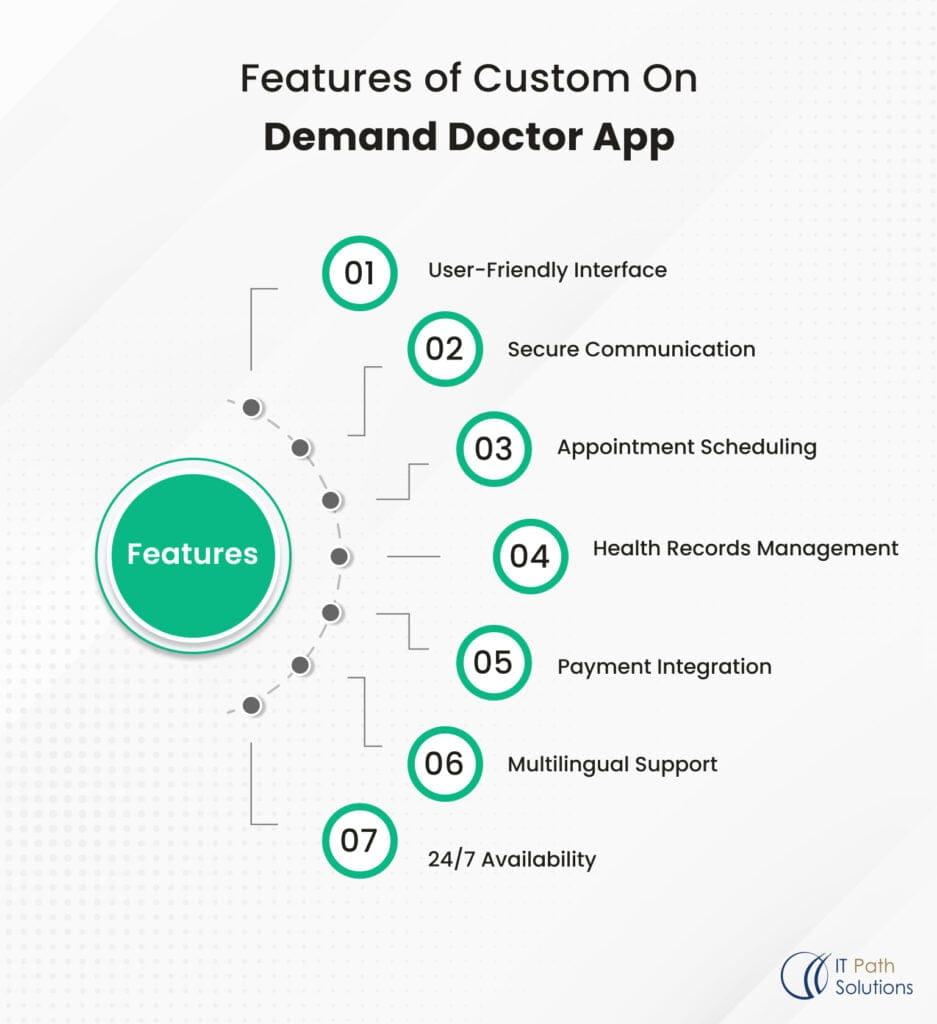
The Process of On-Demand Doctor Apps Development
Okay, but just how do you go about building one of these robust “doctor-in-your-pocket” platforms? It’s a comprehensive process. Here’s a high-level look at it.
Market Research
As with any app development, it all starts with the know the audience stage – studying the market needs, eyeing the competition, thinking through your key feature differentiators, and such actions. A market valued at $112 billion has plenty of room for all players.
Requirements Analysis
With research concluded, it’s time to start mapping out the full blueprints. Who are the key user roles, what core functions must it have, which tech requirements will you need to pull it off? No detail is too small when it comes to developing a healthcare mobile application.
UI/UX Design
Once those requirements are set in stone, the designers take over. They’ll craft the intuitive user flows, slick visual aesthetics, and polished doctor-on-demand app development and prototypes everyone will hopefully love to use over and over.
Backend Development
Now the coders enter the ring to build the whole behind-the-scenes backbone – securely provisioned servers, databases, APIs to stitch it all together seamlessly, you know the drill.
Frontend Development
Of course, all that critical backend plumbing needs a pretty face for real humans to interact with. Enter the frontend – those snappy user interfaces built with cross-platform compatibility in mind.
Integration
To deliver a full-service healthcare solution, chances are you’ll need to mesh in all sorts of third-party hooks – payment processors, telehealth app video platforms, EHR system ties, and more.These integrations are crucial for the success of mobile applications in the healthcare app development .
Testing
With something as sensitive as people’s health data at stake, exhaustive testing for bugs, security holes, usability quirks and performance hiccups is beyond mandatory. No cutting corners!
Maintenance & Updates
But the real work is truly just beginning post-launch. Developers need to commit to the long haul – pushing updates, security patches, added features and improvements based on all that user feedback.
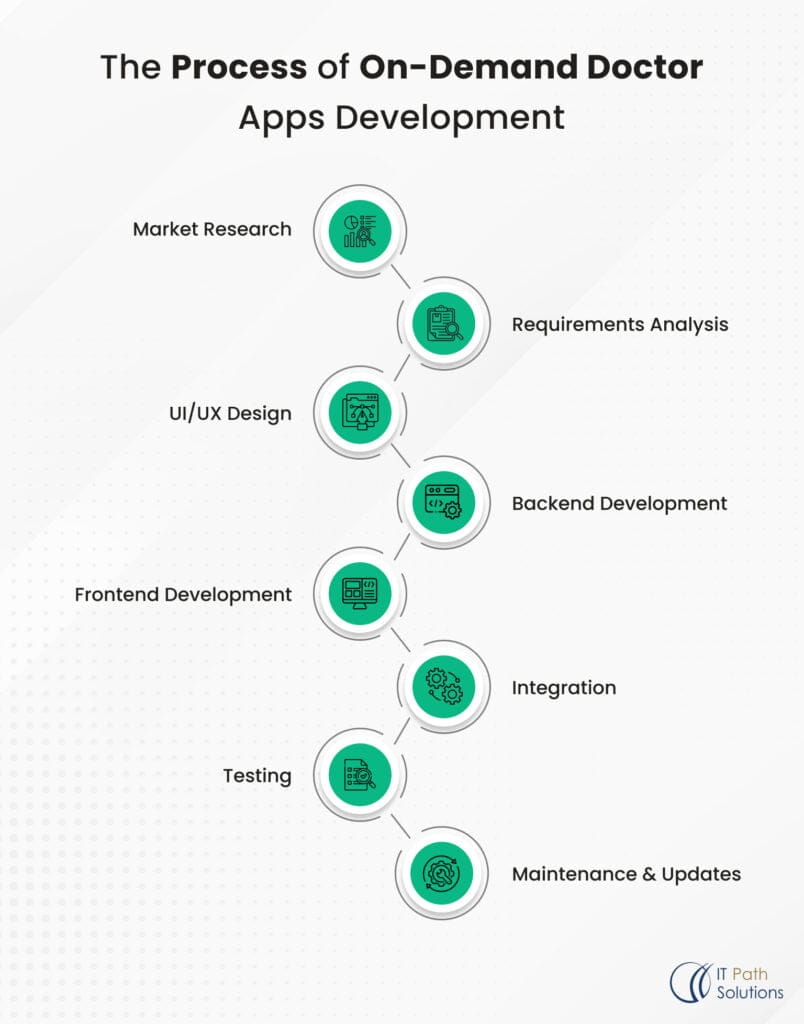
Why is it worth investing in doctor-on-demand mobile app development?
Investing in doctor-on-demand app development offers compelling benefits:
Growing Demand
Let’s be real – the old routine of having to physically trek into a doctor’s office or clinic is starting to feel pretty antiquated these days. Patients are straight up demanding more digital-first, doctor demand app options for managing their care.
Cost Efficiency
Setting aside those expensive clinic leases and overheads, delivering care virtually can massively cut operational costs for providers. Virtual consultation is the cheapest new reality.
Patient Convenience
In our aggressively overscheduled modern lives, removing hurdles like travelling to offices could be a game-changing convenience that patients happily pay for.
Revenue Potential
These doctor demand apps can generate a lot of revenue. There’s plenty of monetization to be utilised through subscriptions, consultation fees, service up-sells and other clever monetization plays.
Improved Health Outcomes
And at the end of the day, easier access to faster diagnosis and care could pay major dividends in better managing all sorts of acute and chronic conditions.
Scalability
Unlike that physical clinic limited by square footage, cloud-based virtual care solutions can nimbly scale to meet usage spikes or expand services overnight.These advantages underscore the importance of telemedicine app development in revolutionising healthcare delivery.
Advanced Futuristic Integration for On Demand Doctor Apps
Artificial Intelligence
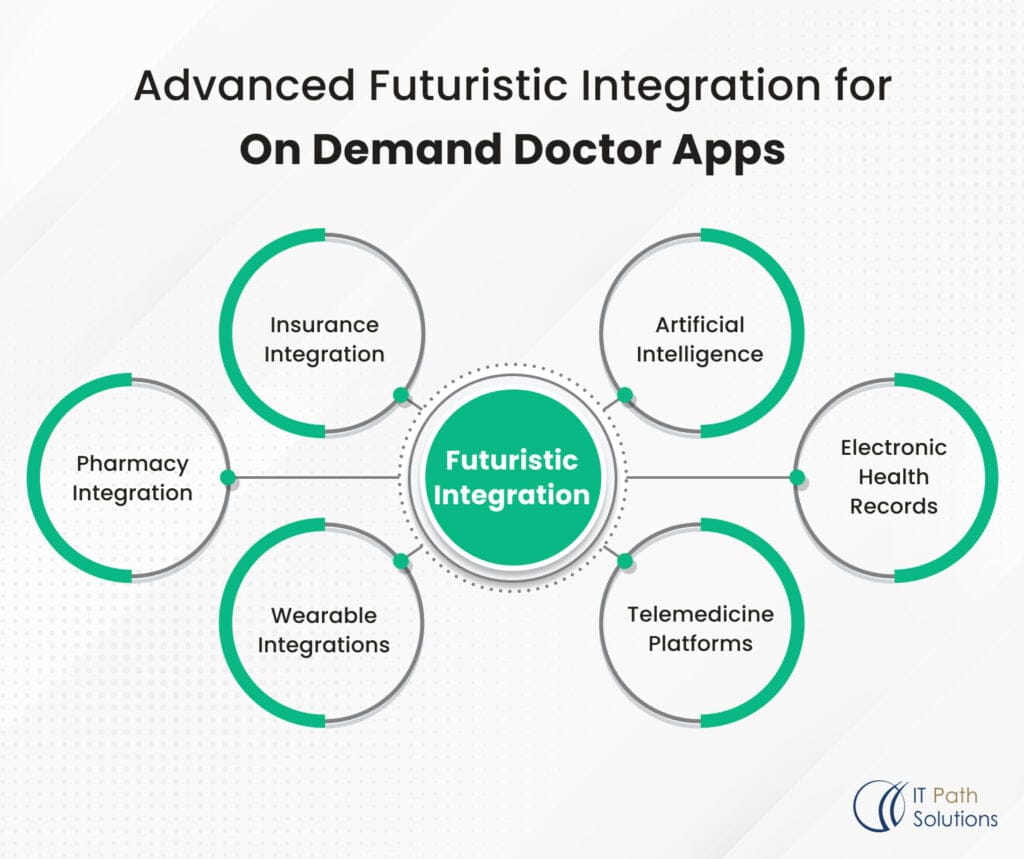
Monetization Models for Doctor On-Demand Apps
Subscription Fees
One of the most common models – charge users a recurring subscription “membership” fee to access the full suite of premium telehealth app services and care.
Consultation Charges
Keep it simple – have users pay an upfront per-visit or consultation fee each time they need to virtually see a doctor through the doctor app development app.
In-App Purchases
Don’t stop at subscriptions – also offer standalone purchases for premium services like personalised health coaching, exclusive clinical content libraries, and advanced analytics.
Advertising Revenue
Don’t ignore those juicy advertising dollars. These apps make for a prime venue to lather on branded sponsored content and paid promos from healthcare partners.
Commission on Services
Rather than selling services directly, some apps take a cut each time a user books third-party services like medication deliveries or lab tests through the doctor demand app platform.
Data Licensing
Respect privacy laws, but anonymised patient data may be licensed to pharmaceutical firms, medical researchers, and other parties eager to pay a premium for such insights.
Challenges of Building On-Demand Doctor Apps
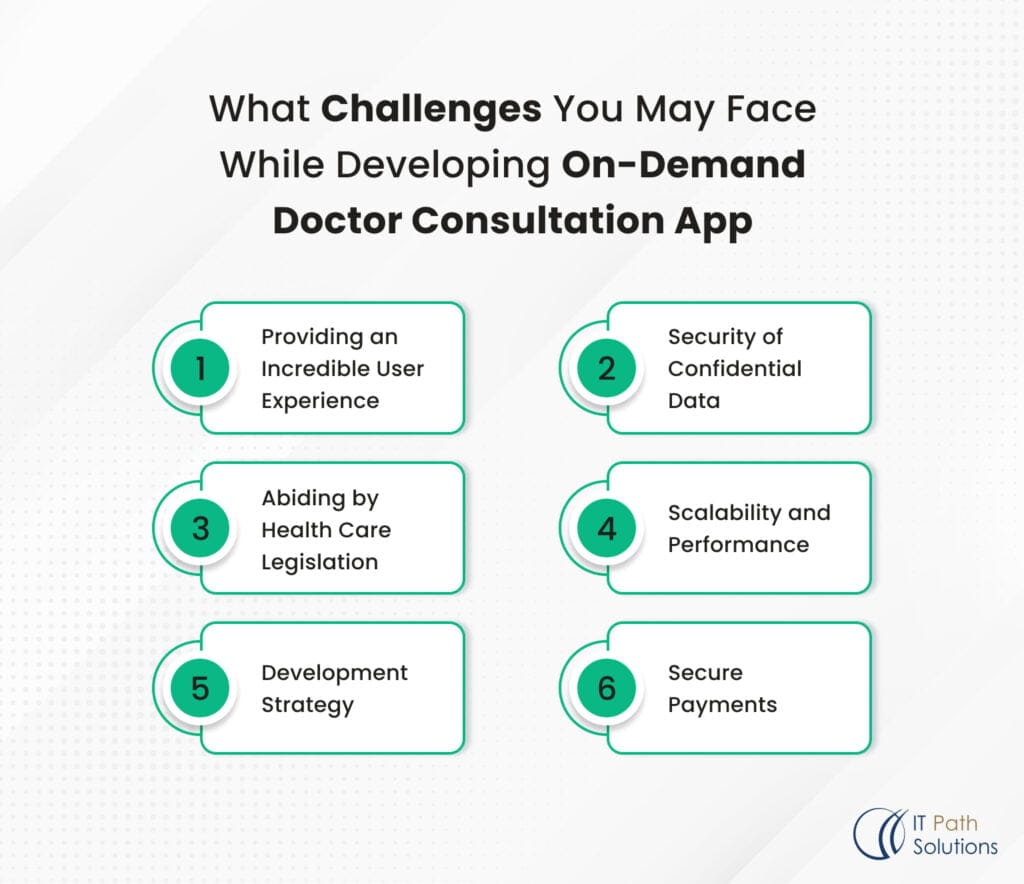
As remarkable as this whole telehealth revolution is, the path to building a successful doctor-on-demand app development definitely isn’t smooth sailing. Some major roadblocks to watch for:
Providing an Incredible User Experience
Let’s face it, poor user experiences and confusing designs are almost fatal in the current app market. It is important to have a nice visual appeal and an intuitive UX.
Security of Confidential Data
I shouldn’t have to remind you how important privacy and data security Healthcare software development requires airtight security, access restrictions, and unbreakable encryption to protect patient privacy.
Abiding by Health Care Legislation
Healthcare services is one of the most tightly regulated industries on the planet for privacy and data handling. Staying compliant with all the evolving rules is a requisite.
Scalability and Performance
These applications cannot simply break under even slight increases in traffic and usage. It’s crucial to design a system that can easily scale up cloud computing resources.
Development Strategy
Between all the dev tool stacks, coding frameworks and platform options out there, just settling on the right technical strategy to actually build these apps is a doctor app development massive decision.
Secure Payments
Offering trusted payment experiences for consultation fees that still tick every privacy and security box is an incredibly high bar that can’t be missed.
How IT Path Solutions Can Empower Your Doctor-On-Demand App Vision
All that functionality definitely sounds compelling, but how does a healthcare app development provider or startup without serious technical resources actually build one of these sophisticated telemedicine app development platforms? That’s where enlisting a specialist dev partner like IT Path Solutions becomes crucial:
Expertise
These folks eat, sleep and breathe healthcare tech – so you’re getting a team intimately familiar with all the nuances and requirements of this regulated space.
Customization
IT Path doesn’t just churn out generic, cookie-cutter apps. Their approach focuses on translating your unique virtual care vision into a fully customized bespoke healthcare services.
Scalability
They build cloud-native apps primed to effortlessly scale resources up and down based on demand spikes, not rigid legacy software doomed to hit ceilings.
Security
Rigorous security protocols for protecting sensitive health data and complying with HIPAA and other privacy laws are built into their DNA – not an afterthought.
Ongoing Support
From launch day through years of maintenance, updates and issue resolution, IT Path sticks around as a committed long-term partner.
Integration
Need to incorporate advanced capabilities like artificial intelligence (AI)/machine learning(ML), telehealth video platforms or EHR connectivity? IT Path’s system integration skills will make it happen smoothly.
FAQs
1: What is a Doctor On Demand App?
A Doctor On Demand app is a telemedicine application that enables remote medical consultations between patients and healthcare professionals through digital platforms like smartphones, tablets, or computers. It offers virtual doctor visits, mental health counseling, e-prescriptions, and more.
2: What are the key features of a Doctor On Demand App?
Key features include teleconsultation services, appointment scheduling, secure communication, prescription services, virtual mental health support, health records management, integration with wearable devices, and multilingual support.
3: What are the benefits of Doctor On Demand App development for healthcare?
Benefits include remote doctor consultations, online appointment booking, reduced in-person visit costs, efficient healthcare resource use, access to health records, global specialist consultations, 24/7 mental health support, remote patient monitoring, urgent care services, and secure communication.
4: How does a Doctor On Demand App integrate with wearable devices?
These apps connect with wearable health devices to monitor vital signs and health metrics in real-time, enabling healthcare providers to track patient conditions remotely and offer proactive care.
5: What is the future of Doctor On Demand Apps in healthcare?
The future includes AI-powered diagnostics, advanced telemedicine features (like AR/VR), deeper integration with wearables, expanded mental health services, remote patient monitoring platforms, personalized healthcare plans, and global collaboration for specialist consultations.
Keyur Patel
Co-Founder
Keyur Patel is the director at IT Path Solutions, where he helps businesses develop scalable applications. With his extensive experience and visionary approach, he leads the team to create futuristic solutions. Keyur Patel has exceptional leadership skills and technical expertise in Node.js, .Net, React.js, AI/ML, and PHP frameworks. His dedication to driving digital transformation makes him an invaluable asset to the company.
Get in Touch
Search
Blog Categories
